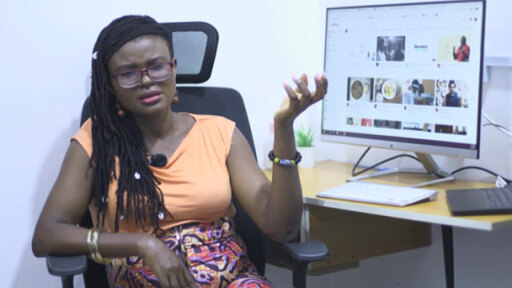Unstoppable: Tobore Ovuorie

"I kept hearing: 'You are a girl, you have to keep quiet, you talk too much,'" Tobore Ovuorie recalls. "There was anger, a sort of rage in me. I did not want to conform." Ovuorie knew she wanted to be a journalist even before entering school. When she was a child, it was her father who encouraged her to write: "On no accounts should I let my voice be silenced. Even if I’m the only person standing, I should continue forging on."
As a woman in journalism, this is what she did. When an editor asked Ovuorie to shed light on sex trafficking, she knew: "We had to go through the process ourselves. Otherwise, the story would be wishy-washy." In 2013, Ovuorie, who had previously lost a friend to traffickers, went undercover in Nigeria’s sex trafficking circles for seven months, with the help of colleagues at Nigeria's online newspaper Premium Times. In what proved to be a life-threatening investigation, the then 33-year-old shed her own identity and posed as a would-be sex worker in Lagos and Abuja with the goal of meeting traffickers involved in smuggling girls to Europe. It worked: She got the go-ahead from her pimp to go to Italy and later escaped the traffickers in Benin.
"Tobore belongs to the kind of people who bring light into darkness where some people don't want to have any light. She is a very courageous woman and colleague," Director General Peter Limbourg said, adding she was "remarkable" for putting herself in danger to uncover the truth, moving "far beyond the journalistic comfort zone." As Europeans, he said, “we are also part of the story” of human trafficking, a multibillion dollar business spanning continents. The International Organization for Migration (IOM) estimates that 80 percent of girls arriving in Europe from Nigeria are potential victims of sex trafficking—one of them Ovuorie’s friend, who later succumbed to AIDS.
During the investigation, the journalist was raped and whipped and became an eye witness of corruption, violence and murder. While her traumatic experiences came as a shock to her at the time, she now says they were "part of the job hazard." The widespread human trafficking ring she uncovered, involved in international sex trafficking and organ trading, has since been the subject of criminal investigations.
"It means so much to me that the work I am so committed to gives a voice to women without a voice and speaks to others as well," Ovuorie said upon receiving the award. She hopes the recognition "can serve as an inspiration for girls and women to be more, especially to follow the path of research in journalism."
On the 2021 World Press Freedom Index by Reporters Without Borders, Nigeria ranks 120 out of 180 countries, the situation of media workers and journalists remains precarious. Ovuorie, who is currently reporting on COVID-19 and investigating the involvement of embassy employees in human trafficking, still receives threats. "It’s an attempt to scare you away. It has taught me to watch my back," she says. "I have to move quite often, I can never stay in the same place for long."
Nonetheless, Ovuorie keeps forging on to fight injustice and "stand up for the voiceless with the power of the written word."
This article is part of the 2021 English issue of the DW corporate magazine Weltzeit.
Read the full magazine here: Weltzeit: Local insight, global reach. Working in a strong network with partners.
